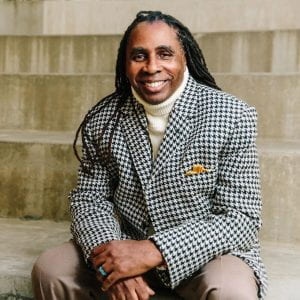
Richard Greggory Johnson III, professor of Public Administration and Policy in the School of Management, and chair of the Institutional Review Board (IRB) at USF, recently co-edited a book titled Lessons in Social Equity: A Case Study Book, Birkdale Publishers, 2022. In conjunction with the book’s publication, Prof. Johnson planned and chaired the 21st Annual Social Equity Leadership Conference (SELC) that was hosted by USF and the National Academy of Public Administration (NAPA). The conference was attended by over 1500 participants, and was organized by a team of over 25 people who worked hard to deliver a program that inspired, informed, and introduced various elements of social equity in public administration and public policy to attendees from numerous fields.
In our conversation, Prof. Johnson talked about his co-edited volume, the 21st Annual SELC conference, and his research interests.
Can you tell us about your recently published, co-edited volume?
The book is the first of its kind on social equity with case studies on how to teach classes on social equity in the field of public administration. The research, broadly speaking, is in the area of human rights, and takes into account issues of race, class, gender, ethnicity and disability. I have been interested in researching these areas for some time now; for instance, the question of “allyship,” and how this concept relates to social equity. The book also takes a global approach to social equity with case studies from places like India where we see many human rights infractions. In the book, we also examine the issue of women in the military and how equity plays out in that case; or, the question of how men are sexually abused in the military, which is a serious matter we don’t hear a great deal about. Other questions of pay scales and social equity, intersectionality, and gender inequality are also covered in the book. At the core of social equity is the idea of human rights, and that’s what we need to pay attention to.
Can you tell us about the conference you organized?
The 21st Annual Social Equity Leadership Conference (SELC) that was hosted by USF and the National Academy of Public Administration (NAPA), was a great success. In short, it was a fabulous conference. Given COVID-19 restrictions, it was a virtual conference with about 1500 people attending online, and 300 speakers. As conference chair, I made the decision early on that we would not be charging registration fees and this was a first for this conference. It will also go down in history as the second SELC conference hosted by a Catholic university, and on the West Coast for the second time. Years ago, we did not have social equity scholars and now we do have them; and, this is changing hiring practices in many different fields, including in academia where social equity is now being included in hiring practices.
How did you get into the field of public administration and public policy? And, how did you choose to become a social equity scholar?
My parents were civil rights workers. They were involved with the National Association for the Advancement of Colored People (NAACP) and the National Urban League. I got a chance to witness firsthand their activities in social movements. I attended an HBCU and that really helped me get to where I am. That said, I got into the fields of public administration and public policy by accident. My undergraduate education was in urban planning, and I had plans to go to law school or pursue a master’s in public administration. At the time, traditional programs in public administration had no focus on social equity and did not pay it much attention. Nonetheless, it was at the University of Vermont where I took up a tenure-track position that I became more aware of social equity and what it meant. I realized that this is what I have been interested in all along, and I had the good fortune that I could now research this area in greater depth. Over the past 20 years, from about 2003 until now, I have been researching areas of equal pay and how this relates to race, ethnicity, and gender in the field of public administration. I am now working on issues of disability in public administration. It has been a fruitful journey.
How did you come to USF?
I was a tenured associate professor at the University of Vermont. I had a home and a great life there. One of my colleagues, a USF professor who is now retired, approached me at a conference and asked if I would be interested in joining USF – because I would be in San Francisco. I took my colleague up on his offer—it was a free trip to San Francisco and an opportunity to get out of Vermont in the winter—and came to interview at USF. I got an offer to teach, and here I am 12 years later.
Research plans for the future?
I always have some book or article in my head. Currently, I am particularly interested in disability awareness and disability rights in the workplace under the umbrella of social equity. I am also drawn to researching intersex individuals in the workplace. There’s not much known on the subject because not so long-ago parents and/or physicians made individuals decide one way or the other, and what we are finding out is that as a child grows up it is quite likely that their gender is something else. I would like my research and work to have an impact globally. I see myself as a citizen of the world, I love to travel, and I am working on further internationalization of the masters in public administration (MPA) degree at USF. This relates to my research interest in cultural competence and intersectionality as they relate to the field of public administration.